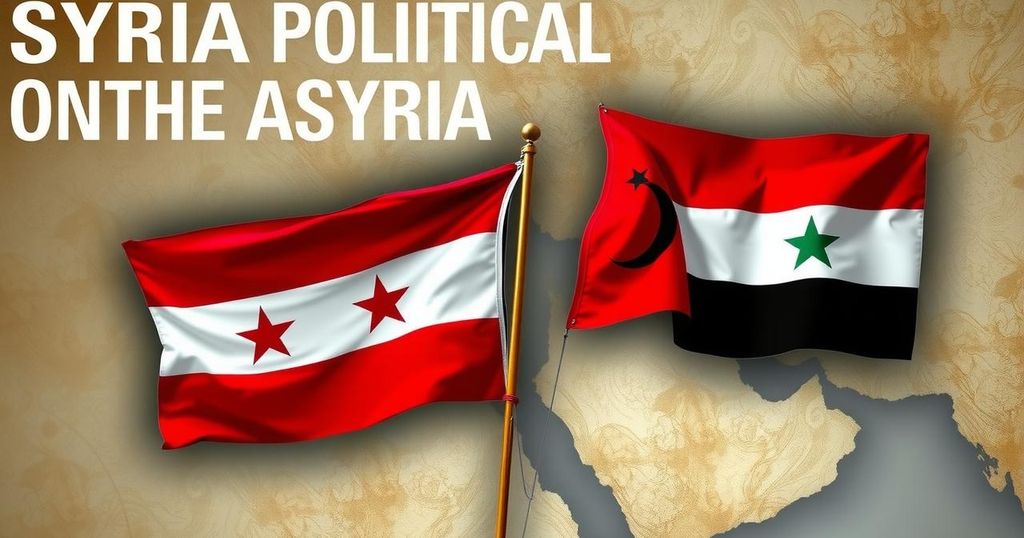Maghreb Nations Adjust Positions as Syria’s Assad Falls

The article examines the reactions of Algeria, Morocco, and Tunisia to the unexpected fall of Bashar al-Assad, highlighting Algeria’s cautious support, Morocco’s long-standing opposition, and Tunisia’s fluctuating allegiances. It also addresses shared concerns about security and the implications of militant returns in the context of recent upheavals in Syria.
The unexpected downfall of former Syrian President Bashar al-Assad has drawn varied responses from Maghreb nations, particularly Algeria, Morocco, and Tunisia. Until recently, Assad had received backing from Algeria, which described the conflict in Syria as a battle against terrorism. However, following the announcement of Assad seeking refuge in Moscow, Algeria shifted to a more cautious stance, advocating for a future governed by the will of the Syrian people and calling for dialogue without foreign interference.
Syria and Algeria share deep-rooted historical ties shaped by mutual ideologies and past struggles against colonialism. This connection has persisted despite Syria’s suspension from the Arab League in 2011, with Algeria remaining supportive. In contrast, Moroccan media expressed skepticism toward Algeria’s stance, suggesting it stemmed from a fear of democratic movements that could threaten both regimes.
Morocco has consistently opposed Assad’s regime, viewing it as linked to broader regional dynamics and past conflicts, particularly relating to similar sentiments against the monarchy. Morocco’s Foreign Minister Nasser Bourita articulated hopes that Assad’s fall would contribute to stability and align with the aspirations of the Syrian populace.
Meanwhile, Tunisia’s initial support mirrored that of Algeria, but recent diplomatic efforts, including a restored relationship with Syria, reflect a shift in policy under President Kais Saied. Tunisia’s historic anti-Assad sentiment was tempered by the reality of ongoing conflicts in the region.
Despite divergences among the three nations, common concerns about security and the return of radicalized fighters from Syria loom large. The rise of opposition groups associated with past militant networks generates anxieties, particularly in Tunisia, where a significant number of citizens had previously engaged in those conflicts. Governments in the region remain vigilant to prevent the re-emergence of extremist elements, emphasizing the need for national security.
The article discusses the implications of the recent political developments in Syria, particularly the fall of Bashar al-Assad, and how it has influenced the geopolitical landscape of the Maghreb region. Algeria, Morocco, and Tunisia are scrutinizing their positions and relationships with Syria against a backdrop of historical ties and recent political shifts. The historical relationship between Algeria and Syria, influenced by shared ideologies and past anti-imperialist struggles, contrasts sharply with Morocco’s longstanding enmity towards Assad. Tunisia’s more complicated relationship, transitioning from support for the Syrian opposition to restoring diplomatic ties under its current administration, also highlights the regional complexities at play. Furthermore, concerns over terrorism and the potential return of radicalized individuals from the Syrian conflict are prompting security considerations across the Maghreb nations.
The fall of Bashar al-Assad represents a significant turning point for Maghreb countries, triggering a reassessment of their foreign policy positions. While Algeria remains inclined towards supporting Syrian sovereignty, Morocco’s historical antagonism towards Assad and Tunisia’s wavering allegiances reflect the diverse responses within the region. Common apprehensions regarding national security and the potential resurgence of militant groups underscore the necessity for these nations to navigate this complex geopolitical landscape thoughtfully. As the situation continues to evolve, these regional dynamics will likely shape future interactions and policies concerning Syria and its aftermath.
Original Source: www.middleeasteye.net








